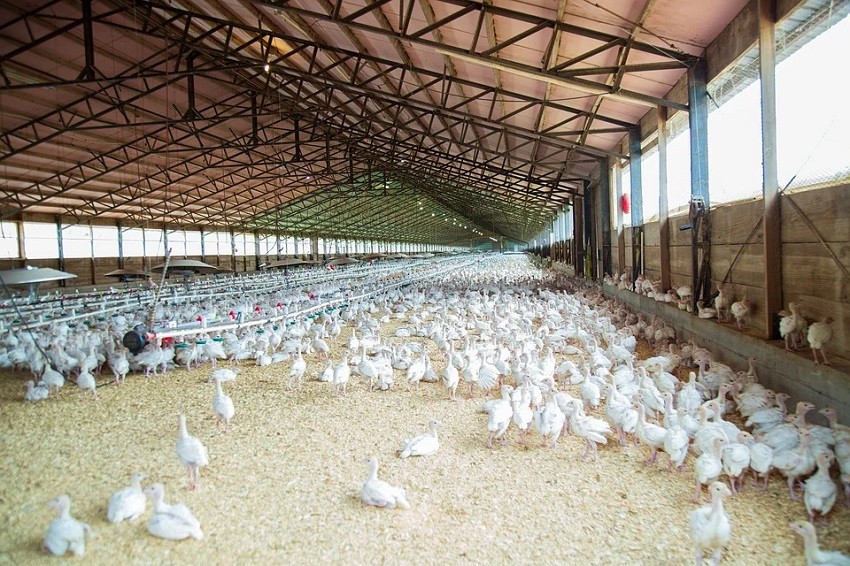We have a very serious communication problem with the state, the reasons for which are unknown, say representatives of the branch organisation of poultry farmers in Bulgaria, trying to define the problems which have accumulated in the sector. The lack of dialogue forced the organization to voice its demands with a protest before the Easter holidays.
At the root of the problem are extremely high feed prices that make it impossible for poultry farms to survive. In addition, the damage caused by the pandemic to the sector is extremely serious; last year, poultry farmers reported losses of more than 80 million BGN (40 million EUR) from primary agricultural production alone.
Poultry farmers fear that this year their losses will be even greater, because in addition to the pandemic there is now a complicated situation in Ukraine."The agricultural sector should have received at least 40 million BGN (20 million EUR) - says Daniel Bojankov, chairman of the Association of Industrial Poultry Farming in an interview with BNR-Blagoevgrad. It should have been included in the Covid measures, but so far there has been no such decision and our demands are not being taken into account. We are already pessimistic that the state will take any action to alleviate our situation."Bojankov stresses that the selling price is much lower than the cost of producing them.
"Since the beginning of 2020 we have not received any support in any way, on any Covid measure, despite a significant budget being allocated to this each year – says Daniel Bojankov. - We as an industry are the biggest consumer of wheat, maize, sunflower. Now, if we do not increase production prices, I do not see how we will survive.

But the price at which we sell is radically different from that of the traders. It is rising very slowly for producers, while feed pricesare rising at record rates.
For Easter there will not be a big increase in the supermarkets because the lots are negotiated in advance, but I hope the increase for producers will be around 30-40% so we can survive the crisis in the market, chairman of the Association of Industrial Poultry Farmers adds."
For almost a year now, poultry farmers have not been heard by the state. They were expecting workable solutions from the caretaker cabinet, but it was in vain. The disappointment was even greater when they came to some understanding with the minister responsible for the budget update, but were later referred to the Ministry of Finance.
However, the Ministry of Finance sent them back on the grounds that their quota for meetings with farmers had already been exhausted.
"We think we have suffered long enough and this attitude to our sector is unacceptable," says Daniel Bojankov. According to him and his colleagues, the whole strategy in agriculture is wrong because a huge part of the funds goes to the grain growers. This has been the case for more than 10 years.
"The problems of pig farmers are similar, so we - livestock farmers - need to unite around the developing of a new concept, a new strategy in our sector, which should cover at least the next 10 years. And once it is developed, we, as representatives of the same industry, must defend it, regardless of who will be in power and who will be the minister in charge."
The systematic neglect of pressing problems by the state has prompted poultry and pig farmers to to stand up and prepare for joint protest action.

"We, the farmers, have never been extreme in our attitude towards the state, but we have a few ideas - the protest will start in Sofia. As we expect that again they will not take our problems seriously, we are ready to protest for a longer time, we will block some roads if necessary. We are also ready to go as far as closing a state border," the Industrial Poultry Association said.
Compiled by: Gergana Mancheva
English version: Elizabeth Radkova
Photos: pixabayThere will be pilot testing of ground-based silver iodide generators for hail protection in two zones where the use of rockets is not allowed, the Deputy Minister of Agriculture Ivan Kapitanov said. At a meeting with Claude Berthet,..
The German economy has been shrinking and the government expects a decline of 0.2% of GDP. Some of the main reasons for this include unresolved structural problems related to lack of energy security, excessive bureaucracy and shortage..
After the election for parliament on 27 October, the caretaker government has to submit a draft of a budget for 2025 to parliament by the end of the month. Some economic analysts say the budget of the country for 2024 is the worst in the past decade. Holes..

+359 2 9336 661
